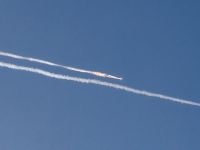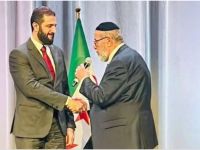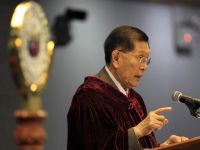The chief UN administrator in East Timor Tuesday defended the omission of one of the worst massacres in last year's violence in the territory from crimes being investigated by the United Nations.
Up to 200 refugees, human rights groups estimate, were killed in the grounds of a cathedral in the southern border town of Suai during a pro-Jakarta militia attack on September 6, 1999.
Catholic priests in Suai say at least 94 bodies have been found, and more than 100 are missing.
The Suai massacre is one of five crimes under investigation by Indonesian authorities, but it is not included in the list of crimes being investigated by the UN's Serious Crimes Unit in East Timor.
The UN unit and its appendage, the Serious Crimes Panel, which is made up of international and East Timorese judges, are looking into some 300 crimes committed between January 1 and October 25, 1999, UN spokeswoman Barbara Reis told AFP.
Before departing East Timor early Tuesday, the head of a visiting UN Security Council delegation revealed the team had put its position on the omission to UN administrators.
"We have made our point known to them on that and they are going to look into it," delegation chief, ambassador Martin Andjaba, told a media conference.
However he declined to spell out the delegation's views.
"We have our own views about it, and we will make final recommendations for future action."
East Timor administrator Sergio Viera de Mello said the Indonesian investigation into the Suai massacre ruled out the need for a duplicate investigation by UN investigators here.
"We are trying to be complementary to the Indonesian investigation," De Mello told the conference.
"There's no point for us to investigate the same crime."
De Mello said the UN had provided 30 investigators from Jakarta's Attorney General's Office with all the evidence it had on the Suai massacre.
"So we'll now wait and see whether the Indonesian judiciary will have the human rights tribunal established ... and tries the suspects," he said.
If a human rights tribunal is not established (by Indonesia) or fails to try suspects, De Mello said, "we will open the (Suai) case."
Indonesian Attorney General Marzuki Darusman has named 23 suspects, including three generals and six militia leaders in the five cases it is probing. One of the militia leaders has since been killed.
The Indonesian parliament on November 6 endorsed a new human rights law which provides for a maximum of 25 years jail for gross rights violations, including genocide and crimes against humanity.
However the establishment an of ad hoc rights tribunal to try the crimes still needs both presidential and parliamentary approval.
Indonesian Democratic Party of Struggle (PDI-P) MP Herdono (eds:one name) told the Jakarta Post last week that an article in the law made it possible for superior officers and civil servants to be held responsible for rights abuses committed by their subordinates.
The article circumvents fears that officers in the Indonesian military (TNI) would go unconvicted due to legal loopholes.
"There will be no more trials where only lower ranking soldiers are prosecuted while their superiors go free," Herdono said.
At least 600 people are known to have been killed in the wave of militia violence that engulfed the tiny half-island territory last year after the East Timorese voted overwhelmingly for independence from Jakarta.
A shrine erected in the Suai cathedral on the first anniversary of the massacre bears the names of some 200 known or suspected victims, including three priests.
A few meters (yards) away, at the foot of the church entrance, is a tiny shrine of potted plants and crucifixes, and a cross bearing the inscription: "This is where Father Dewanto Tarsiso was killed by militia and TNI" -- DILI (AFP)
© 2000 Al Bawaba (www.albawaba.com)







